Our first trip to Yellowstone National Park Begins!
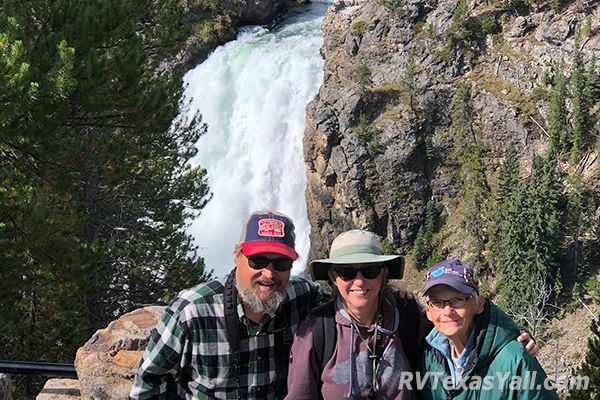
Exploring Yellowstone National Park
As the first US National Park, and one you hear a lot about, we expected to enjoy our first visit to Yellowstone National Park. But we did not expect to be completely amazed the way that we were. Holy cow y'all!
This incredible park has jaw-dropping scenery and fascinating wildlife around every corner. And just when you've seen the most amazing thing you've ever seen, something else tops it! We experienced so many awe-inspiring places in Yellowstone, that we've decided to write four posts about our experiences there. First up: Bridge Bay Campground, the Grand Canyon of the Yellowstone, Mammoth Hot Springs and more!
Historic Roosevelt Arch
We entered Yellowstone National Park through the North Entrance. Our path brought us down along the river, through the tiny town of Gardiner and under the iconic Roosevelt Arch. We chose this route specifically to be able to enter the park via this historic Arch.
The North Entrance is the original major entry point into the park. The park road between the arch and Mammoth Hot Springs was built in 1884. When the railroads came to Gardiner in 1903, park visitors would take the train to Gardiner, board a horse-drawn coach, and travel under the archway to their park adventures.
The arch is named for Theodore Roosevelt who happened to be camping in the park in 1903. He agreed to speak at the cornerstone laying ceremony of the arch. This is thought to be the last time that President Roosevelt visited Yellowstone, so he never saw the completed arch in person.
Camping at Yellowstone National Park
There are 12 campgrounds offering over 2,000 campsites within Yellowstone National Park. A lot of these campsites are appropriate for RVs. While it's definitely beneficial to have a smaller RV, some of the campsites within the park can accomodate larger rigs. Some of the campsites are reservable in advance and others are first come, first served. We stayed in two of the campgrounds during our visit to Yellowstone: Bridge Bay Campground and Grant Village Campground. All of the campsites in the park are dry camping (no hookups), with the exception of campsites within the Fishing Bridge RV Park which is closed for renovations until at least Fall 2020.
Please note the size limits for each campground. It's important to know the total length of your RV and vehicle before you try to make reservations or arrive at Yellowstone. Unfortunately, we saw a larger RV become wedged between trees and a post while trying to fit into a site that they were too big for.
As is the case with many National Parks, cell service in the campgrounds and throughout Yellowstone is extremely limited.
Reservable Campgrounds in Yellowstone
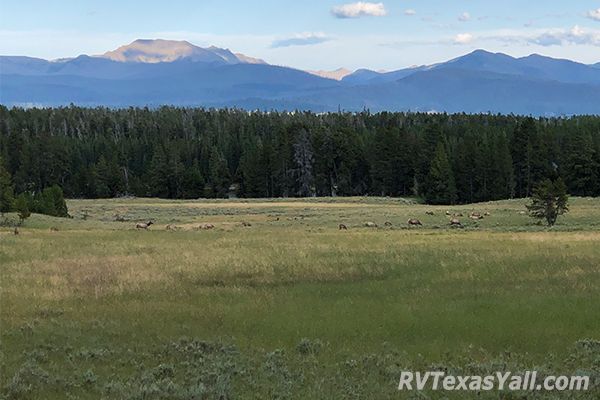
Yellowstone View
Bridge Bay Campground
Max Combined Vehicle Length: right around 40'
432 Campsites
Elevation: 7,800 feet
Dry Camping, Generators Allowed 8am-8pm
Dump Station and Flush Toilets
Canyon Campground
Max Combined Vehicle Length: 40'
273 Campsites
Elevation: 7,900 feet
Dry Camping, Generators Allowed 8am-8pm
Dump Station and Flush Toilets
Pay Showers (2 nightly showers included in camping fee)
Laundry
Fishing Bridge RV Park
Closed for renovations until at least Fall 2020.
Max RV Length: 40'
Hard-Sided Campers Only
340 RV Sites
Elevation: 7,800 feet
Full Hookups
Dump Station and Flush Toilets
Pay Showers (2 nightly showers included in camping fee)
Laundry
Grant Village Campground
Max Combined Vehicle Length = 40'
430 Campsites
Elevation: 7,800 feet
Dry Camping, Generators Allowed 8am-8pm
Dump Station and Flush Toilets
Pay Showers (2 nightly showers included in camping fee)
Laundry
Madison Campground
Max Combined Vehicle Length: 40'
278 Campsites
Elevation: 6,800 feet
Dry Camping, Generators Allowed 8am-8pm
Dump Station and Flush Toilets
First Come, First Served Campgrounds in Yellowstone
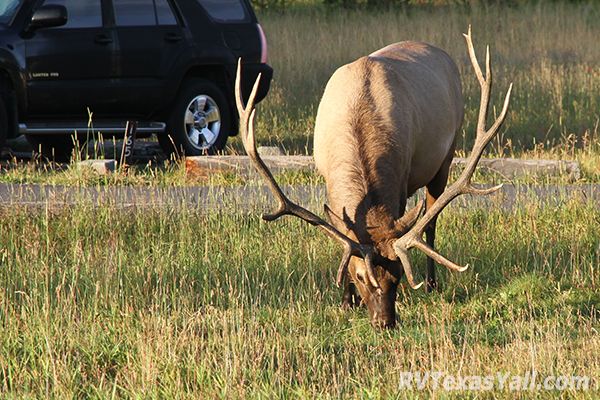
Bull Elk at Bridge Bay
Indian Creek Campground
Max Combined Vehicle Length = 35'
70 Campsites
Elevation: 7,300 feet
Dry Camping, No Generators Allowed
No Dump Station
Vault Toilets
Lewis Lake Campground
Max Combined Vehicle Length = 25'
85 Campsites
Elevation: 7,800 feet
Dry Camping, No Generators Allowed
No Dump Station
Vault Toilets
Mammoth Campground
Max RV Length = 30'
85 Campsites
Elevation: 6,200 feet
Dry Camping, Generators Allowed 8am-8pm
No Dump Station
Flush Toilets
Norris Campground
Max Combined Vehicle Length = 50' (2 sites). There are also 5 30' sites.
111 Campsites
Elevation: 7,500 feet
Dry Camping, Generators Allowed 8am-8pm
No Dump Station
Flush Toilets
Pebble Creek Campground
Max Combined Vehicle Length = 50'
27 Campsites
Elevation: 6,900 feet
Dry Camping, No Generators Allowed
No Dump Station
Vault Toilets
Slough Creek Campground
Max Combined Vehicle Length = 30'
16 Campsites
Elevation: 6,250 feet
Dry Camping, No Generators Allowed
No Dump Station
Vault Toilets
Tower Fall Campground
Max Combined Vehicle Length = 30'
31 Campsites
Elevation: 6,600 feet
Dry Camping, No Generators Allowed
No Dump Station
Vault Toilets
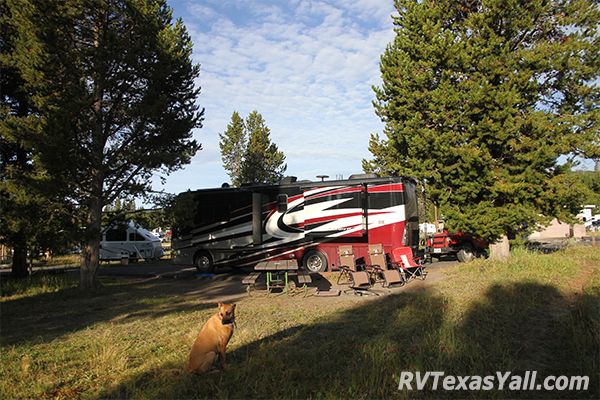
Our Campsite at Bridge Bay
Camping at Bridge Bay Campground
When we decided to visit Yellowstone, we were excited to find out that there were some campsites in the park that could accomodate RVs over 30 feet in length. Not surprisingly, the larger your rig, the more limited your options for camping within the park boundaries. When we went online to book a campsite, we saw a few available options for RVs 40' or smaller. However, as we began to fill in the forms, we realized they were looking for a combined vehicle length (motorhome and tow vehicle) of 40' or less. Together, our Tiffin Breeze and Jeep come in at right around 43 feet. Luckily, there was a note on the form that instructed us to call the reservations office if we were longer than 40' combined.
That turned out to be a great call. We were able to reserve two nights in the Bridge Bay Campground and four nights in the Grant Village Campground. They gave us instructions to park the Jeep in another parking area if it did not fit completely within our campsites with the motorhome.
We'll have more on our experience in the Grant Village Campground in a future post. But today, we want to share a bit more about our experience camping in the Bridge Bay Campground.
When we pulled up to check in at Bridge Bay Campground, the super nice camp host walked us through the check-in process, gave us the lay of the land, shared bear and wildlife safety information and told us "good luck" fitting our rig into the sites in this older campground.
Located in Southeast Yellowstone National Park between the Lake Village and West Thumb areas, Bridge Bay Campground has back-in and pull-through campsites in multiple loops. Our area had trees, but also had a good deal of open space. Our pull-through site wasn't huge or wide, it had a pretty good U-shape to it, and it wasn't level. But we fit the RV and the Jeep without a problem.
The campground was quiet and clean. Elk passed through multiple times during our 2-night stay. We had a picnic table and a fire ring. The clean restrooms with flush toilets and and sinks were right across from our site.
Bridge Bay also featured an amphitheater within the campground which hosted nightly ranger programs which were excellent! They were so good, in fact, that a herd of elk decided to attend the presentation one night!!
Just outside of the Bridge Bay Campground is the Bridge Bay Marina, home to boat tours and fishing excursions on Yellowstone Lake, a store and the campground dump station with potable water.
Bridge Bay Campground is open each year from late May to early/mid-September. The nearest visitor center is at Fishing Bridge.
Grand Canyon of the Yellowstone
You'll find the Grand Canyon of the Yellowstone on the East side of the park. This area of the park is unlike anything else we saw here. And that, to us, is one of the things that makes Yellowstone National Park so special. There are surprises and unique features around every corner.
It's believed that the Grand Canyon of the Yellowstone began to form between 140,000 and 160,000 years ago. The walls of the canyon are full of former and current hydrothermal features which cause the unusual colors. Today, the Yellowstone River continues to carve the canyon, which runs from Lower Falls to Tower Fall at Tower-Roosevelt.
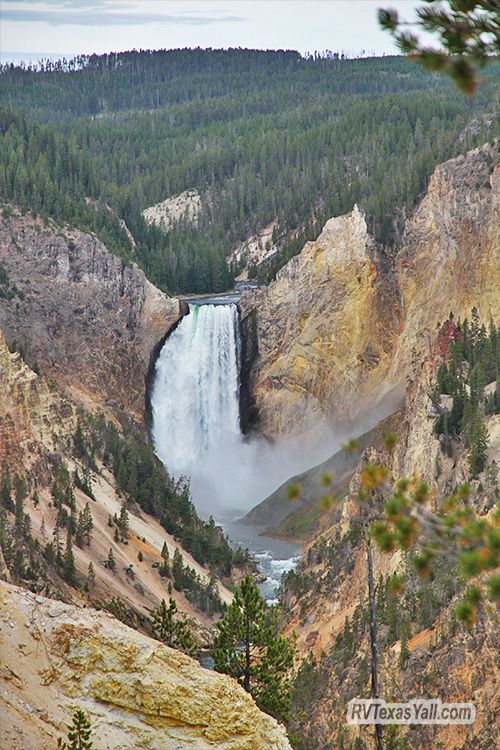
Lower Falls
The Grand Canyon of the Yellowstone is 20 miles long, up to 4,000 feet wide, and more than 1,000 feet deep.The views here are amazing and the colors are awesome. If you have time, plan to visit during different times of the day with a variety of lighting on the canyon walls.
Things to See in the Canyon Area of Yellowstone
When you are in the area, be sure to stop in to see the Upper and Lower Falls, the Canyon Visitor Center and Artist Point.
The Canyon Village area also has a full-service gas station (they came to our rescue and repaired the Jeep when we broke down in Canyon). You'll also find camping, a lodge, an amphitheater, and food.
Tower-Roosevelt
Continuing North from Canyon, you'll find Tower-Roosevelt. This area gets its name because this was the location of President Theodore Roosevelt's campsite when he visited the park. The Roosevelt Lodge Cabins here were built in 1920.
Things to See at Tower-Roosevelt in Yellowstone
Even if you don't do anything else in this area of the park, be sure to swing by to check out Tower Fall. The viewing deck is just a short walk from the Tower General Store.
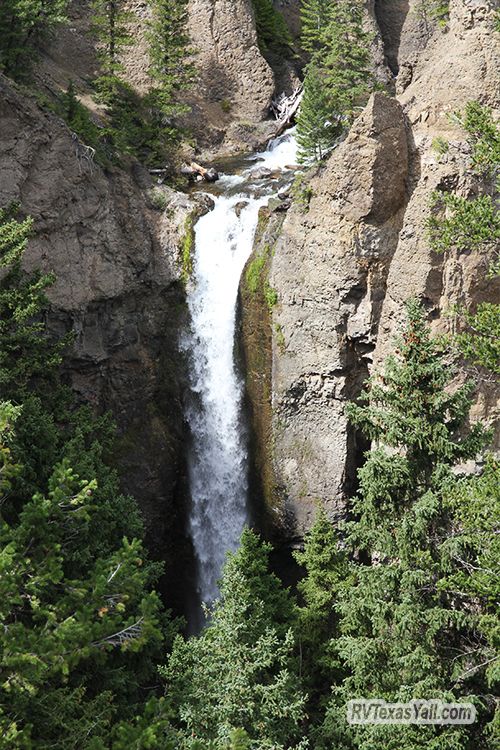
Tower Fall
The 132 foot drop through eroded volcanic stone was one of the earliest captures of artist Thomas Moran who's paintings were instrumental in the establishment of Yellowstone as our nation's first national park.
Just East of Tower Junction is the world's largest concentration of petrified trees... Specimen Ridge. You can get up close to an example of these petrified trees by visiting Petrified Tree. You'll see the turnoff just after you leave Tower-Roosevelt on your way to Mammoth Hot Springs.
Tower-Roosevelt is also the area to come to for stagecoach rides, horseback rides and an Old West style cookout.
Mammoth Hot Springs
Continuing further North and back West, you'll come to Mammoth Hot Springs. Since we entered the park through the North Entrance, Mammoth Hot Springs was the first major area we saw on the way into the park. We visited the area again a couple of days into our visit.
Y'all know we love history, and Mammoth Hot Springs is full of history. Fort Yellowstone was established here in 1886 to protect Yellowstone from poachers, vandals and squaters. Today, many of the fort buildings are used to house park employees and other administrative functions, but you can visit the Visitor Center (formerly the Single Officers Quarters).
And then there are the AMAZING Mammoth Hot Springs Terraces. We can't even begin to explain these hydrothermal features. Generations of calcium carbonate rich water flowing over these ever growing terraces have built some of the most unbelievable structures we've ever seen.
Things to See at Mammoth Hot Springs in Yellowstone
While you're in Mammoth Hot Springs, check out the Albright Visitor Center, Fort Yellowstone, and, of course, the Mammoth Hot Springs Terraces which can be toured via hiking or by car (not RV).
The Fort Yellowstone Parade Grounds in front of the Visitor Center are a great place for a picnic. We studied the sink holes (they have barricades around them) and watched elk pass by as we ate lunch.
The Mammoth Hot Springs Hotel was built here in 1883. It was the first grand hotel in a national park and was the staging area where visitors would board stagecoaches for their tour of the park.
Just off the main road behind the visitor center in Mammoth Hot Springs is the only log building from the 1800s still standing in the area. The Mail Carrier's Cabin was built in 1895 and served as a resting point for the rural mail carrier who's route took him several days to complete.
This Is Just The Beginning of Our Yellowstone Adventure!
For more on our Yellowstone National Park experience, check out Part 2 of our adventure where we share all about Old Faithful and the Upper Geyser Basin!
Learn more about Yellowstone National Park's history.
Take an online tour of Fort Yellowstone.
Check the Weather at Yellowstone National Park.
Learn about the park's Ranger Programs.


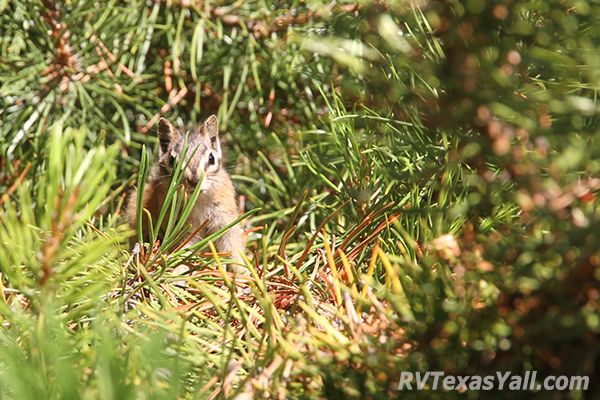
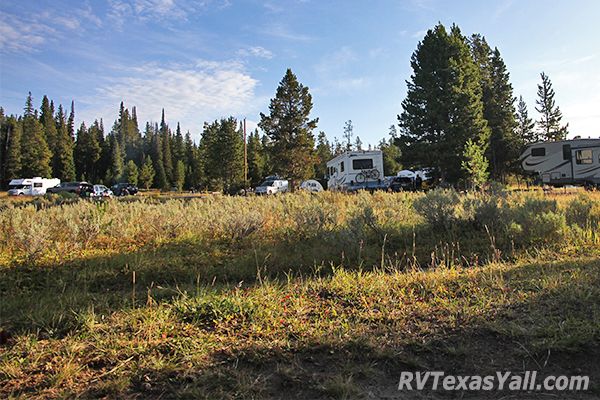
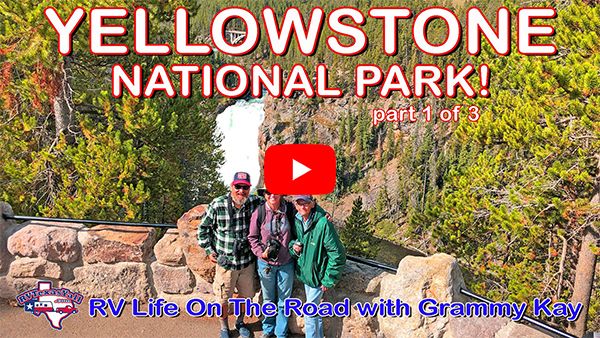
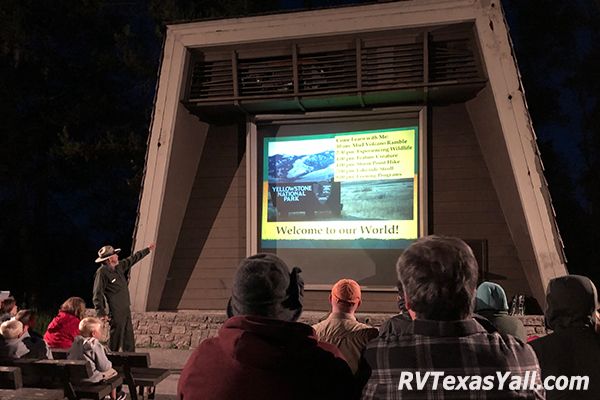
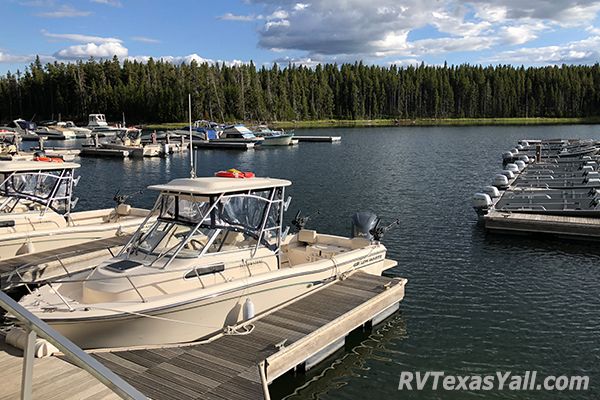
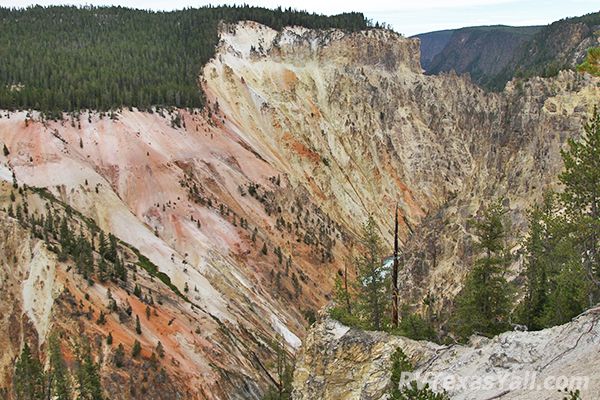
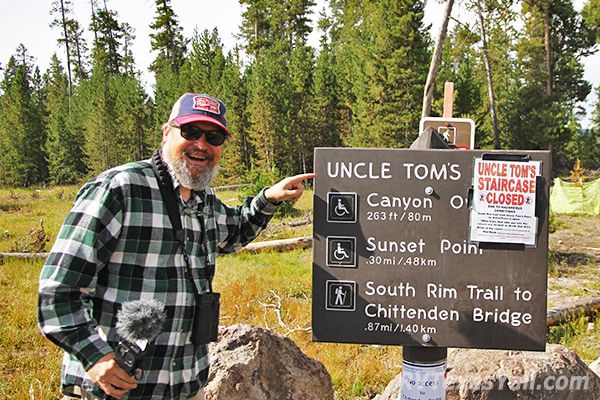
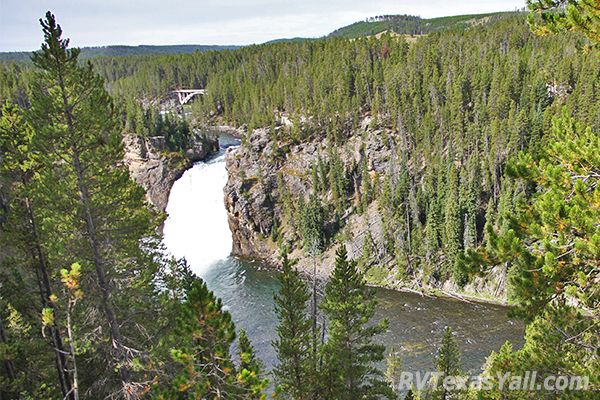
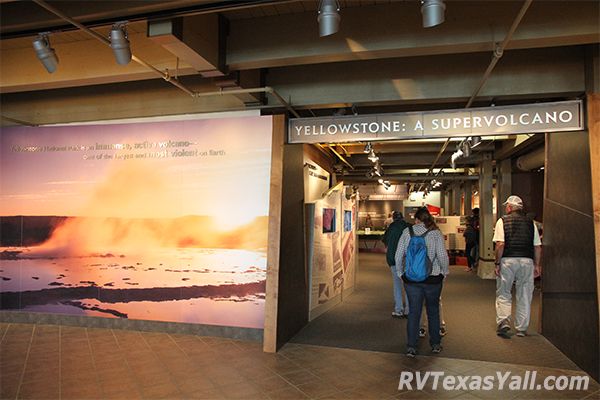
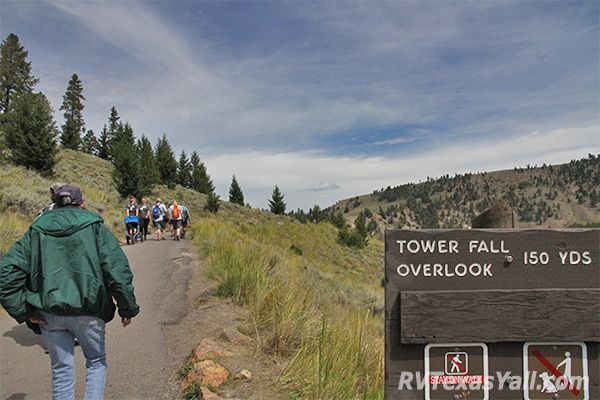
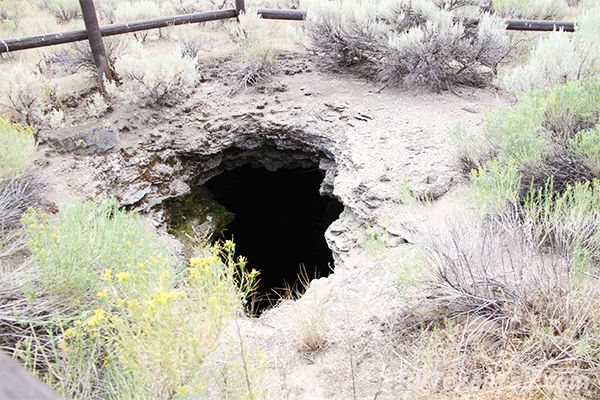
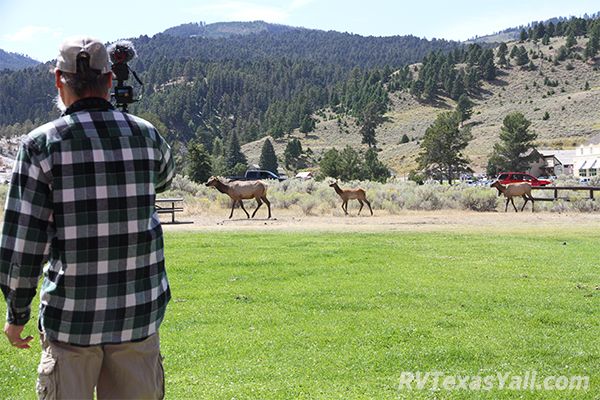
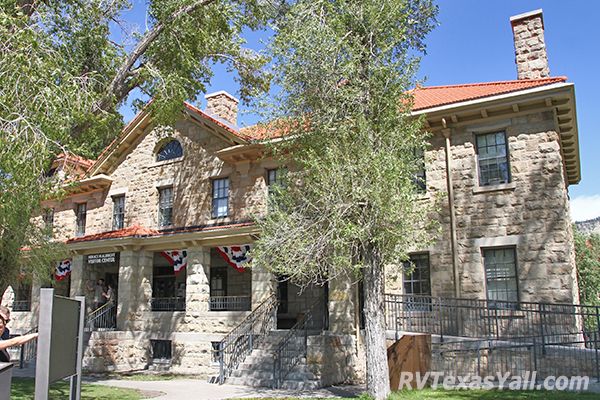
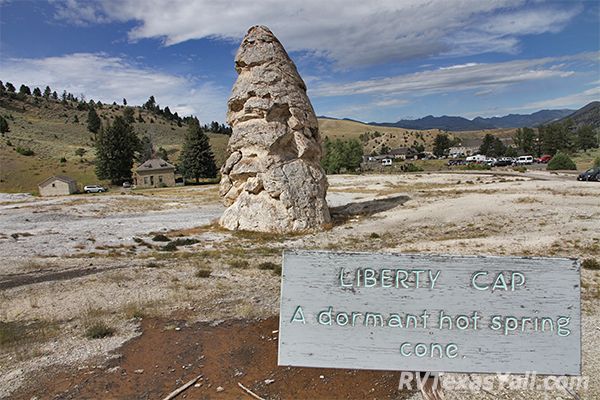
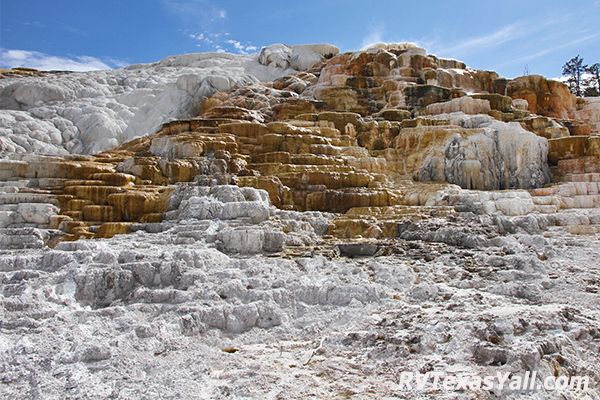
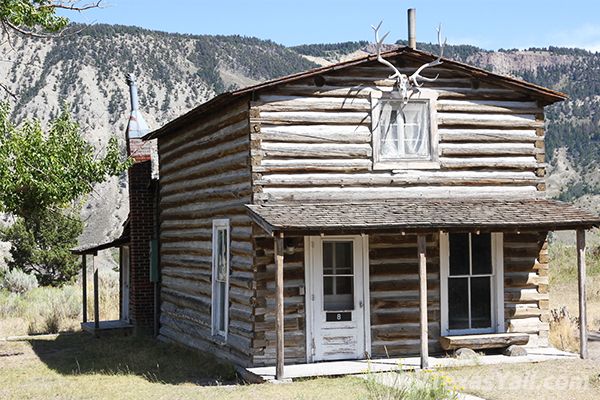
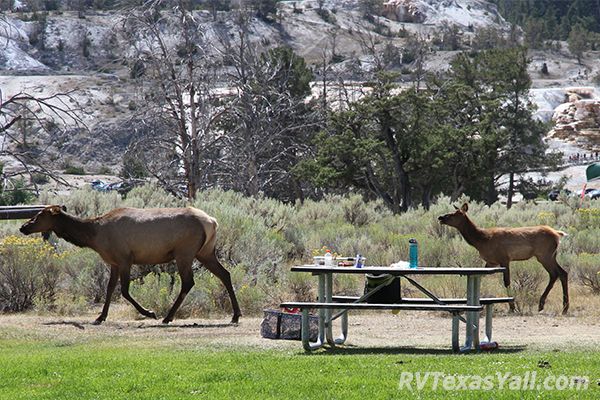
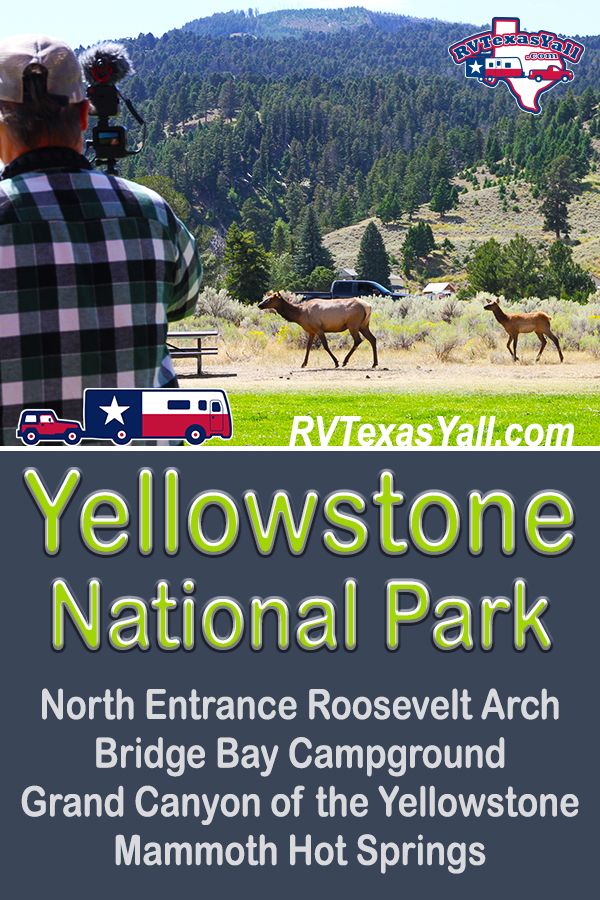
Share Your Thoughts:
We always love hearing about your travels and seeing pictures of your campsites, rigs and quirky, fun places you visit! Please join us in the RV in Texas Facebook Group or in the RV Texas Y'all Community on RVillage. Want more info? Learn more about our Facebook Group!
Safe Travels and Happy Camping!